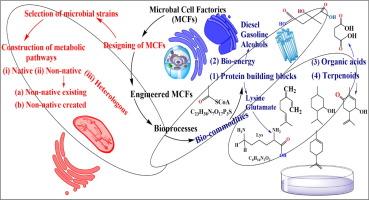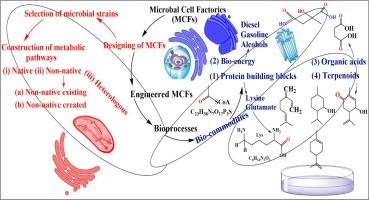利用工程化 MCF 进行各种生物商品的工业化生产:微生物稳健性工程战略
IF 13.2
1区 工程技术
Q1 ENGINEERING, CHEMICAL
引用次数: 0
摘要
以环境可持续的方式利用可再生的非食用生物质合成有价值的生物产品,如生物燃料和生物聚合材料,对于应对因严重依赖化石燃料资源而造成的紧迫环境挑战至关重要。在此背景下,工程微生物细胞工厂(MCFs)(一种改良微生物)受到关注,主要涉及利用可再生碳源生产所需生物商品的生物合成优化途径。根据所选择的基因修饰微生物宿主,生产此类生物商品的生物合成途径可分为三类:本地途径、非本地途径和人工途径。工程微生物菌群在制药、食品和生物化学工业中越来越重要,目前正在开发这种菌群,以应对不断增长的世界人口和社会经济危机。主要是利用微生物制造一系列生物产品,如氨基酸、羧酸、类胡萝卜素、酶、维生素、植物天然产品、沼气和其他生物燃料。此外,新陈代谢工程技术通过改变碳-能量平衡和消除不需要的 ATP 吸收汇、新陈代谢、生理和应激反应,提高了商业上重要物质的生产速度、浓度和效率。工业生物技术的快速发展得益于用于生产多种生物商品的工程化 MCF。本综述概述了 MFC 的设计、微生物菌株的选择、代谢途径、用于工业规模应用的工程 MCF、微生物稳健性工程策略、商业限制及其未来前景。本文章由计算机程序翻译,如有差异,请以英文原文为准。


Industrial–scale production of various bio–commodities by engineered microbial cell factories: Strategies of engineering in microbial robustness
The utilization of renewable, non–edible biomass for synthesis of valuable bio–products including bio–fuels, bio-chemicals and bio–polymeric materials, in an environmentally sustainable manner is crucial for addressing the urgent environmental challenges caused by our substantial dependence on fossil fuel resources. In this context, engineered microbial cell factories (MCFs), which are the modified microorganisms, have gained attention and provide biosynthetically optimized pathways for the production of desired bio–commodities using renewable carbon sources. Biosynthetic routes for the production of such bio–commodities can be categorized into three groups based on the chosen microbial host for genetic modification: native, non–native, and artificial pathways. Engineered MCFs are increasingly essential in the pharmaceutical, food, and bio–chemical industries and are being developed to address the growing world population and socioeconomic crisis. Mainly, microorganisms have been utilized in the manufacturing of a range of bio–products including amino acids, carboxylic acids, carotenoids, enzymes, vitamins, plant natural products, biogas, and other biofuels. Furthermore, the implementation of advanced metabolic engineering and synthetic biology tools & techniques enhances the speed, concentration, and efficiency of commercially important substances by modifying the metabolism, carbon–energy balance and eliminating an undesired ATP sink, physiology, and stress response. All these has resulted in rapid growth of industrial biotechnology for production of several bio–commodities. Further, the scale and numbers of bio–commodities is increasing with time. This review summarizes the design of MFCs, selection of microbial strains, metabolic pathways, engineered MCFs for industrial–scale applications, strategies for engineering microbial robustness, commercial restrictions, and their future prospects.
求助全文
通过发布文献求助,成功后即可免费获取论文全文。
去求助
来源期刊

Chemical Engineering Journal
工程技术-工程:化工
CiteScore
21.70
自引率
9.30%
发文量
6781
审稿时长
2.4 months
期刊介绍:
The Chemical Engineering Journal is an international research journal that invites contributions of original and novel fundamental research. It aims to provide an international platform for presenting original fundamental research, interpretative reviews, and discussions on new developments in chemical engineering. The journal welcomes papers that describe novel theory and its practical application, as well as those that demonstrate the transfer of techniques from other disciplines. It also welcomes reports on carefully conducted experimental work that is soundly interpreted. The main focus of the journal is on original and rigorous research results that have broad significance. The Catalysis section within the Chemical Engineering Journal focuses specifically on Experimental and Theoretical studies in the fields of heterogeneous catalysis, molecular catalysis, and biocatalysis. These studies have industrial impact on various sectors such as chemicals, energy, materials, foods, healthcare, and environmental protection.
 求助内容:
求助内容: 应助结果提醒方式:
应助结果提醒方式:


